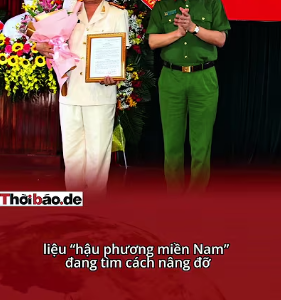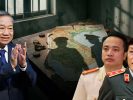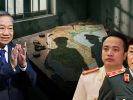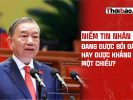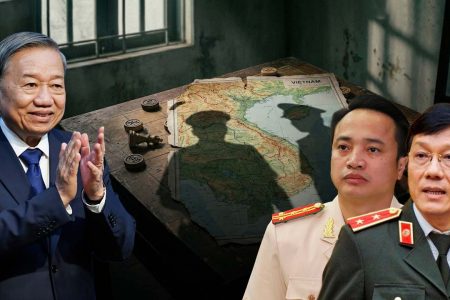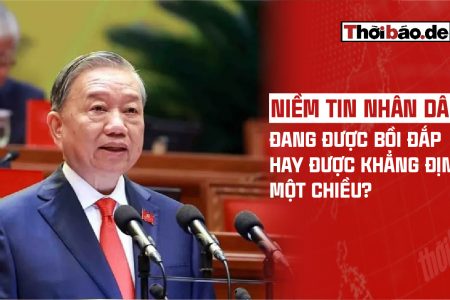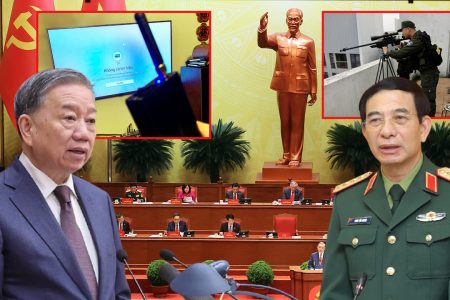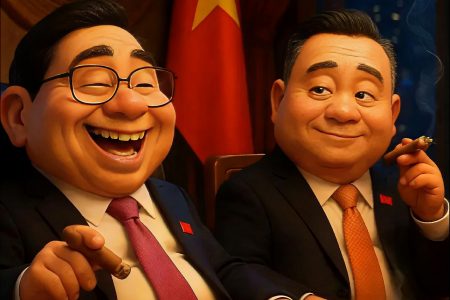
On June 25, 2020, Han-Nom researcher Tran Khue, a well-known dissident passed away in Saigon, a number of democracy activists and human rights in Vietnam shared their views on the power and prospects of democracy, human rights and civil society activities in the country, ahead of the 13th National Congress of the ruling Communist Party of Vietnam (CPV) and long term.
Through talks on June 29, activists told BBC News Vietnamese about whether the generations following famous dissidents such as Tran Khue or Hoang Minh Chinh, etc., can now do something or not.
Freelance journalist Cat Linh (from Hanoi): The next generation will have their own role. The information world has been flooded, it is not difficult to develop the ability to think critically and in different ways, each citizen will gradually understand the asymptoticities of the shoulds and don’ts. They will continue their role in society.
Master Nguyen Tien Trung (former political prisoner, from Saigon): It can be said that Professor Hoang Minh Chinh and Han-Nom researcher Tran Khue were the first two people who inspired me to actively participate in democracy movement. In 2006, the two men themselves established the Vietnam Democratic Movement. Immediately after that, it was also Professor Hoang Minh Chinh who restored the Democratic Party of Vietnam and took the new name of the Democratic Party of the 21st century. Professor Hoang Minh Chinh was its general secretary, and researcher Tran Khue was his deputy. The perseverance, the courage to be committed to justice, freedom, and democracy for the two elderly people made me very touched. I believe that the next generation will certainly push the democracy movement further because of the better times, more modern technology, and higher intellectual standards. And the next generation can learn a lot of lessons from the activities of the previous generation.
Activist Nguyen Vu Binh (former editor of the Communist Review, former political prisoner): All generations of dissidents in Vietnam can do the same thing, which is to educate people and contribute to the process of self-collapse of the Vietnamese communist regime. The difference between the next generation and the first generation of Hoang Minh Chinh, Tran Do and Mr. Tran Khue, Pham Que Duong, Le Hong Ha and Nguyen Thanh Giang is the efficiency of the intellectual activities due to the expansion of Internet systems and social networks, especially Facebook.
Doctor of Science Nguyen Quang A (former director of the Independent Policy Review Institute – IDS): I have never met Mr. Tran Khue, but I have read his articles and especially because I know that Mr. Pham Que Duong and Mr. Tran Khue decided to set up the association to help the CPV fight against corruption but they were imprisoned, so I heard about Khue very much, he had the respectful knowledge of a resilient struggle literally up to the last breath. The following generations must follow in their footsteps, learn from their experience, promote their beauty, and avoid errors if they committed, creating new and trendy ways to push the movement forward.
What should not be compared?
BBC: It is said that many people in the dissident circle, the activists of the previous class have the position and professional position, thereby having a strong and profound influence on the community and people. How about the next generation? What are their new features and what are their strengths and weaknesses?
Cat Linh freelance journalist: If the next generation is the people who have the status, position, expertise and contribute critics to society, it is very important. Because they are the ones who have the opportunity to express their wishes, requests .. directly at government agencies. If you are a professional, at least words will be persuasive and will be heard …
Disadvantages can be said to be reduced, and they also have the opportunity to learn themselves. The world is becoming more and more easily connected so they will learn many things and visions, the perspective will be changed in an objective direction.
Suong Quynh activist (independent journalist from Saigon): First of all, I want to say that to those who struggle for freedom and democracy, like Hoang Minh Chinh and Tran Khue are always good examples with consistent valuable road to struggle for our generation to learn and follow.
With the first generation, they have really gained extensive and influential knowledge so their voice is prestigious and awakening for the next generation. But at that time they were too few and severely suppressed. But the generation now has the advantage that the Internet has mounted and can spread a case. Thus, due to the spread of information, many people have been awakened and more and more people joined when the authorities could not conceal the information as before.
MSc Nguyễn Tiến Trung: The activists of the next generation have more diverse components and that is the advantage. The previous class consisted of revolutionary elders, those who were trained by the regime, while the next generations, besides those who came out of the regime, there were also independent intellectuals, peasants, and land petitioners and workers, etc. Thanks to social networking, information and influence on the community spread far better than previous generations.
Mr. Nguyen Vu Binh: The position and expertise if helping to affect the community is not much. What made a profound and profound impact on the community and people of the previous generation is their knowledge and judgment. The previous generation who participated in the democracy movement have come to a conclusion, and they struggle towards that conclusion and goal. That is, it is necessary to struggle to change social regimes. To draw that conclusion, they must learn, research as well as internal struggle a lot. Because of that research and firm conclusions, they are respected and admired by many.
Dr. Nguyễn Quang A: There are always people like that. Do not compare one person with another, one time with another!

„Respectfully, don’t decry„
More and more young Vietnamese are interested in civil society and human rights issues
BBC: Some people wonder if certain weaknesses compared to the previous generation, the previous class, will probably create a hard-to-overcome weakness, or some people call it a “bad spot” in a part of the unintended generation. At the present time, the political dissent, which limits the attractiveness of public opinion, can affect the development of the democracy movement in Vietnam, do you agree with this view?
Freelance journalist Cat Linh: My opinion is not. Because in order for a country to develop, an independent and mature nation, all citizens, especially the left, must grow and be independent from themselves. Every citizen has a role to protect and build the country.
Mrs. Suong Quynh: In my opinion, a weakness of the previous generation and this generation is that the ego cannot be ignored, that is, it is only possible to disagree with each other to not shake hands with each other to discuss and come to the end doing the same purpose. In other words, not only political disagreements with the authorities but also disagreements with each other so that it is difficult to unite honestly. Another weakness is due to the level of awareness and knowledge crammed in the period of Socialism very backward and shortsighted. Those who struggle are not trained professionally, which is also the cause in disagreements.
MSc Nguyễn Tiến Trung: From my personal perspective, one of the biggest points that makes me wonder is the lack of unity in democracy and civil society movement to create greater strength, both for the previous generation and the next generation. However, it is pluralistic, it must accept this phenomenon. Over time, excellent organizations and individuals will attract the masses, gather a wider social force to be able to build true democracy in Vietnam.
Mr. Nguyen Vu Binh: The common weakness of the current generation of dissidents is that the common knowledge base is not equal to the previous generation. Because most are educated in a Socialist environment, where the goal of education is ignorant. One of the major, but very difficult to overcome, problems of the current generation is the lack of cultivating knowledge, being less willing to learn from those who go ahead while the Vietnamese communist society is extremely complex. The lack of knowledge, along with aggression and conservative instincts, lead to constant and endless debates and debates affecting the solidarity and atmosphere of the democracy movement.
Doctor Nguyen Quang A: Those who have a great influence have a disability, that disability also has an influence later, but the next generation must always have a critical view: relying on the beauty of their predecessors to promote the trendy today and avoid the bad, but always in the spirit of respect and construction, not to decry.
Try taking a ‘portrait’ photo
BBC: From your perspective, if there is a portrait of dissidents, democracy activists, human rights, civil society … in Vietnam today, the most striking feature is there. What is awareness?
Ms. Suong Quynh: In order to recognize the portrait of the activist, most of them go to Facebook to write disagreements with the policy or the case of the government towards the country and the people. Or those who took to the streets to protest or sign petitions.
MSc Nguyễn Tiến Trung: I believe it will be a colorful picture. From my personal experience, many individuals and organizations, silently and publicly, in the communist party and outside the party, are taking a variety of ways to contribute to the process of democratization.
Mr. Nguyen Vu Binh: It is very difficult to have a common picture for Vietnamese dissidents today. However, if you have to generalize, it is courage, steadfast in the struggle but quite impulsive and superficial, conservative. Quite creative in fighting and always maintaining humor in fighting.
Dr. Nguyen Quang A: More crowded, more diverse, more efficient but still weak compared to the requirements of society.
Future design, achievements?
BBC: Whether the methods, measures and strategies against peaceful evolution and internal transformation against the leadership of the government, the State and the Communist Party of Vietnam have promoted in recent years, have been causing difficulties. Is it certain for the dissident movements and activists mentioned above? In the new situation, new context, which are these adaptations?
Freelance journalist Cat Linh: I sometimes do not understand concepts such as „fighting against the peaceful evolution“ … because in my opinion, dissent is just giving new ideas to build the country, protect national peace. So adapting is not necessary.
Ms. Suong Quynh: The methods of the government against the struggle movement are increasingly fierce and persecuted, preventing sternly and making the movement of fighting on appearance no longer frantic but yet to continue, those who struggle to write more to raise people’s awareness as well as give more truthful news to the people. And the way to raise people’s awareness as well as their sense of responsibility is also a way to fight for a peaceful but slow progress.
MSc Nguyễn Tiến Trung: Measures to suppress, divide, isolate and arrest activists that have made it difficult for the democracy movement. That’s for sure. However, more and more activists will appear because of social injustice, environmental pollution, corruption and so on. I have personally witnessed the explosion in the number of democracy activists and civil society from 2006 to the present (2020). 2006 was the year I officially became a public democracy activist.
So far, there have been many repressions and arrests of activists, but in the end, the democracy movement has always been more and more powerful. Democratization is the indispensable rule of society.
Before the oppressive measures of the authorities, the activists must be more cautious and wiser to survive in order to maintain and develop the movement. The red line that the authorities have clearly drawn though not specified in the Criminal Code: not to establish organizations, not to have foreign relations, not to advocate violence, not to broadcast (livestream) called for protests …
Mr. Nguyen Vu Binh: The persecution and prosecution of people belonging to civil society groups in Vietnam, the severe suppression of protests, the streets of people and dissidents make current dissidents face many difficulties. However, in that situation, the dissidents turned to cyber activities in the direction of actively criticizing policy directions, specific incidents that were analyzed and commented critically. At the same time, activists should promote the lawsuits and fight according to the available laws. Some groups have stepped up their struggles through international routes, applying foreign laws to punish rulers for human rights violations.
Dr. Nguyễn Quang A: Certainly, it is difficult, but if you know how to use it to fight against yourself the tactics to bend the truth of the authorities, then it is an advantage.
Above are the views of the interviewees, please welcome to watch the second part of the exchange between BBC News Vietnamese and activists, dissidents from Vietnam, in which the opinions are about difficult problems of activists in daily life, earning a living and vision for the future of their country.
Thoibao.de (Translated)





